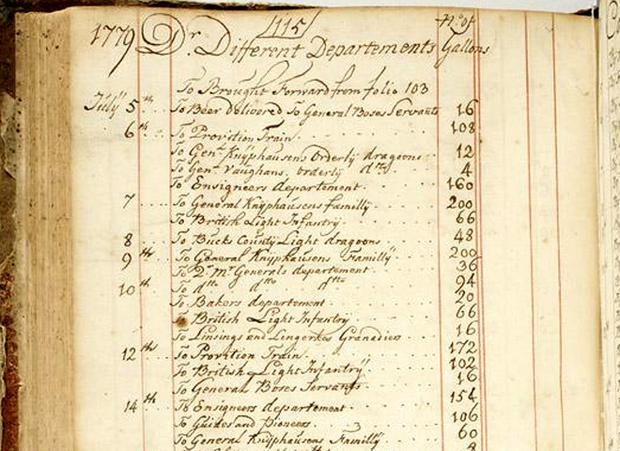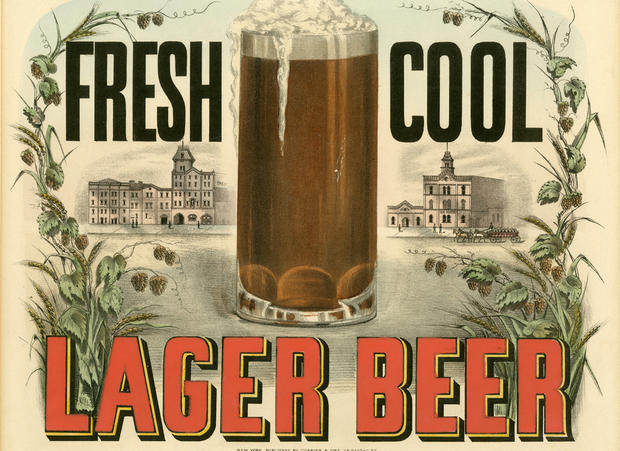NYC museum's beer exhibit offers history on tap
(AP) NEW YORK - Beer was hip in New York long before hipsters were into craft brews, according to a new exhibit at the New York Historical Society that traces the history of beer all the way back to drunken Colonial times.
And it's not your typical staid museum display: There's even a bar at the end of it.
"Beer Here," which opens Friday in New York City and runs through Sept. 2, aims to show that beer is steeped in the state's alcoholic history. From a manifest with beer orders for George Washington's troops to the diary of a 14-year-old hop picker, the exhibit capitalizes on the growing popularity of microbreweries and beer gardens. And it makes the case that, once upon a time, New York — once called New Amsterdam — was at the forefront of the American beer scene.
"Beer was very important to New Yorkers from the earliest point of colonization," said museum curator Debra Schmidt Bach. "The Dutch have a strong beer tradition, so it was a very common drink in their culture, and that's true for the English, as well."
Beer here: Brewing New York's History (Exhibit info)
New York City was notorious for its taverns in the mid-1700s, when there were more watering holes here than in any other colony after Dutch colonists brought beer over by the boatload from Europe. Back then, beer was often healthier to drink than water.
"Clean water was a huge issue," Schmidt Bach said. "And most of the sources that had been developed in the early 18th century were pretty polluted by the 1770s. So absolutely, beer was much cleaner."
Scratched, cloudy-looking ale and porter bottles excavated from lower Manhattan are on display as evidence of beer's popularity there during the 18th and 19th centuries. And an accounting ledger from tavern owner William D. Faulkner — no relation to the famous writer — shows he supplied beer to thirsty Revolutionary War soldiers, Continental and British soldiers alike.
Old-fashioned tools used to harvest ice in upstate New York are on display, detailing the process that enabled brewers to keep beer cool during the warmer months. Hops became a commercial crop in 1808, thanks to the state's hop-friendly climate, and Bavarian lagers arrived soon afterward, brought by German immigrants seeking political asylum.
The museum also has old packages of hops from that era, which were used for medicinal purposes to treat everything from sleeplessness to "all disordered conditions of the Nervous System."
But blue mildew outbreaks and spider mite infestations decimated the hops a century later — and the advent of Prohibition was the death knell for New York's dominance as a viable hops-growing area. The region has lagged behind the rest of the country's beer entrepreneurs ever since.
But the explosion of microbreweries in recent years has some people hoping beer is making a comeback.
"Twenty years ago, on the West Coast, the market there was much bigger at that time than it is here now," Taylor said. "There's nowhere to go but up. It's going to get tremendously popular."
Some advertisements from the 1950s and 1960s inspired Ben Hudson, the marketing director at Brooklyn Brewery, who got an early look at the exhibit. The ads included six-packs of Rheingold beer cans from 1952, featuring pretty girls with red lips who competed in the beer maker's "Miss Rheingold" beauty contest. (The yellow satin dress worn by "Miss Rheingold" of 1956 was also on display.) "It's so cool to see what our forebearers though was a good idea," Hudson said. "Entire print ads devoted to how beer brings out a sense of liberty as an American? I just get a great kick out of that."
The exhibit's final stop is an actual tasting room, where visitors can sample the latest lagers and ales from local breweries.
"This is a great exhibit to show that it's not a fad," said Kelly Taylor, the brew master for the Manhattan-based Heartland Brewery, which provided some of the beer. "People think of the cheap beer you get in the grocery store. It's like no, there's actually a history; it's a way of life. It's like this incredible old world beverage that people take for granted."

